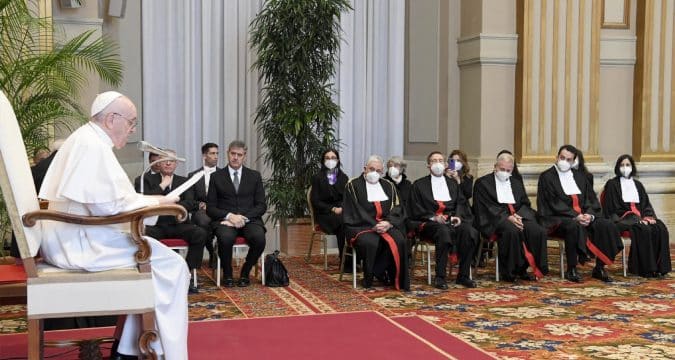
VATICAN (CNS): Financial and judicial reforms are not only meant to bring the Vatican up to date with international standards of transparency but also to make the church’s structure reflect “an increasingly evangelical style,” Pope Francis said on March 12.
Meeting with judges, prosecutors, investigators and other members of the Vatican’s state tribunal, the pope said that when it comes to financial management and transparency, “the Church must be exemplary and irreproachable, especially on the part of those who hold important roles of responsibility.”
The pope’s comments at the formal opening of the court’s judicial year came less than a week before Angelo Cardinal Becciu, former prefect of the Congregation for Saints’ Causes, was expected to testify at a trial against him and nine other defendants on charges related to financial malfeasance.
The trial revolves around a controversial property deal in which the Vatican lost millions of dollars. At the time of the property deal, then-Archbishop Becciu served as sostituto, the No. 3 position in the Vatican Secretariat of State.
The Italian cardinal, who is accused of embezzlement, also will be questioned about his alleged involvement in misappropriating Vatican funds and redirecting them to Spes, a Caritas organisation run by his brother, Tonino Becciu, in his home Diocese of Ozieri, Sardinia.
Welcoming the members of the Vatican court, Pope Francis thanked them for the “dedication with which they engage in the delicate service of the administration of justice.”
Indeed, law and judgment must always be at the service of truth and justice,
Pope Francis
as well as of the evangelical virtue of charity.
Even in the court’s work, he said, “synodality,” is necessary, because in judicial matters, all participants in a trial “are called to contribute to ascertaining the truth through cross-examination, comparison of arguments and careful examination of the evidence.”
The pope said, “This walking together therefore requires an exercise of listening, which, as we know, belongs to the very nature of a just process. In judicial activity, magistrates are required to constantly exercise honest listening to what is argued and demonstrated by the parties, without prejudice or preconceived ideas.”
While justice implies a careful evaluation of “opposing positions” and discernment, he said, it must “always be combined with instances of mercy, which ultimately invite conversion and forgiveness.”
Pope Francis said, “There is a complementarity between these two poles and a balance must be sought, in the awareness that, if it is true that mercy without justice leads to the dissolution of the social order, it is also true that mercy is the fullness of justice and the most luminous of the truth of God.”
The pope said that further work is needed to update legislation “in the area of criminal procedure and international cooperation,” as well as in the development of procedures that allow for the pursuit of justice and the protection of all, “especially the weakest and most fragile.”
He said, “Indeed, law and judgment must always be at the service of truth and justice, as well as of the evangelical virtue of charity.”








